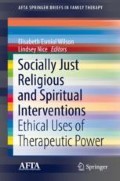Abstract
Religious disaffiliation of a family member from a shared family faith can have a significant impact on family relationships. Family members often experience significant amounts of loss, feelings of disconnection and disorientation, and search for reconnection across differences. In this chapter, we will describe our research on families going through these experiences and will use a case study to demonstrate ways in which therapists can help families navigate these challenging processes. Goals include helping family members cultivate insight into their own responses to disaffiliation, helping them to process their emotions around the experience, working to foster improved distress tolerance skills, and encouraging effective communication that builds connection and creates healing between members.
Access this chapter
Tax calculation will be finalised at checkout
Purchases are for personal use only
References
Altemeyer, B., & Hunsberger, B. (1997). Amazing conversions: Why some turn to faith and others abandon religion. Amherst, NY: Prometheus Books.
Beder, J. (2004). Loss of the assumptive world: How we deal with death and loss. Omega, 50(4), 255–265.
Curtis, K. T., & Ellison, C. G. (2002). Religious heterogamy and marital conflict: Findings from the National Survey of Families and Households. Journal of Family Issues, 23(4), 551–576.
Esmiol Wilson, E. (2018). From assessment to activism: Utilizing a justice-informed framework to guide spiritual and religious clinical interventions. In E. Esmiol Wilson & L. A. Nice (Eds.), Socially just religious and spiritual interventions: Ethical uses of therapeutic power, AFTA Springer Briefs. Cham, Switzerland: Springer.
Fisher, A. R. (2016). A review and conceptual model of the research on doubt, disaffiliation, and related religious changes. Psychology of Religion and Spirituality. Advance online publication, 1–10, https://doi.org/10.1037/rel0000088
Hunsberger, B., & Altemeyer, B. (2006). Atheists: A groundbreaking study of America’s nonbelievers. Amherst, NY: Prometheus Books.
Knudson-Martin, C. (2013). Why power matters: Creating a foundation for mutual support in couple therapy. Family Process, 52, 5–18.
Kosmin, B. A., & Keysar, A. (2009). American nones: the profile of the no religion population. In In American religious identification survey. Hartford, CT: Trinity College.
Krause, N., & Wulff, K. (2004). Religious doubt and health: Exploring the potential dark side of religion. Sociology of Religion, 65(1), 35–56.
Lichter, D. T., & Carmalt, J. H. (2009). Religion and marital quality in low-income couples. Social Science Review, 38(1), 168–187.
Mahoney, A. (2010). Religion in families 1999 to 2009: A relational spirituality framework. Journal of Marriage and the Family, 72(4), 805–827. https://doi.org/10.1111/j.1741-3737.2010.00732.x
Mahoney, A., Pargament, K. I., Jewell, T., Swank, A. B., Scott, E., Emery, E., et al. (1999). Marriage and the spiritual realm: The role of proximal and distal religious constructs in marital functioning. Journal of Family Psychology, 13(3), 321–338.
McCarthy, K. (2007). Pluralist family values: Domestic strategies for living with religious difference. Annals of the American Academy of Political and Social Science, 612, 188–208.
McMillen, J. C. (1999). Better for it: How people benefit from adversity. Social Work, 44(5), 455–468.
Myers, S. M. (2006). Religious homogamy and marital quality: Historical and generational patterns, 1980–1997. Journal of Marriage and Family, 68(2), 292–304.
Siegel, D. J. (2006). An interpersonal neurobiology approach to psychotherapy. Psychiatric Annals, 36(4), 248–256.
Siegel, D. J. (2012). The developing mind, second edition: How relationships and the brain interact to shape who we are. New York: Guilford Press.
Smith, T.W., Marsden, P., Hout, M., & Kim, J. (2011). General social surveys, 2010. National Opinion Research Center: The Roper Center for Public Opinion Research, University of Connecticut.
Stokes, C. E., & Regnerus, M. D. (2009). When faith divides family: Religious discord and adolescent reports of parent-child relations. Social Science Research, 38, 155–167.
Vargas, N. (2012). Retrospective accounts of religious disaffiliation in the United States: Stressors, skepticism, and political factors. Sociology of Religion, 73(2), 200–223. https://doi.org/10.1093/socrel/srr044
Winell, M. (2007). Leaving the fold. Berkeley, CA: Apocryphile Press.
Author information
Authors and Affiliations
Editor information
Editors and Affiliations
Rights and permissions
Copyright information
© 2018 American Family Therapy Academy
About this chapter
Cite this chapter
Knight, A., Esmiol Wilson, E., Nice, L. (2018). Protecting Family Bonds: Examining Religious Disaffiliation Through a Spiritually Informed Family Systems Lens. In: Esmiol Wilson, E., Nice, L. (eds) Socially Just Religious and Spiritual Interventions. AFTA SpringerBriefs in Family Therapy. Springer, Cham. https://doi.org/10.1007/978-3-030-01986-0_3
Download citation
DOI: https://doi.org/10.1007/978-3-030-01986-0_3
Published:
Publisher Name: Springer, Cham
Print ISBN: 978-3-030-01985-3
Online ISBN: 978-3-030-01986-0
eBook Packages: Behavioral Science and PsychologyBehavioral Science and Psychology (R0)

